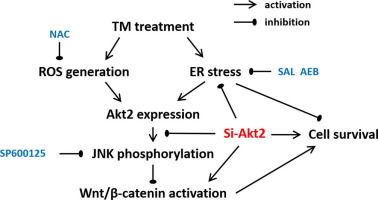Bioorganic & Medicinal Chemistry Letters ( IF 2.7 ) Pub Date : 2017-12-14 , DOI: 10.1016/j.bmcl.2017.12.031 Yan-Xia Gao , Wen-Ting He , Long-Fei Pan , Hui Feng , Jiang-Li Sun , Bin Zhang , Lei Yu , Li-Jun Li

|
Akt, also known as protein kinase B (PKB), is a serine/threonine kinase that promotes survival and growth in response to extracellular signals. Akt1 has been demonstrated to play vital roles in cardiovascular diseases, but the role of Akt2 in cardiomyocytes is not fully understood. This study investigated the effect of Akt2 knockdown on tunicamycin (TM)-induced cytotoxicity in cardiomyocytes and the underlying mechanisms with a focus on the JNK-Wnt pathway. TM treatment significantly increased the expression of Akt2 at both mRNA and protein levels, which was shown to be mediated by the induction of reactive oxygen species (ROS). Knockdown of Akt2 expression via siRNA transfection markedly increased cell viability, decreased lactate dehydrogenase (LDH) release and reduced cell apoptosis after TM exposure. The results of western blot showed that downregulation of Akt2 also attenuated the TM-induced activation of the unfolded protein response (UPR) factors and ER stress associated pro-apoptotic proteins. In addition, Si-Akt2 transfection partially prevented the TM-induced decrease in nuclear localization of β-catenin. By using the selective inhibitor SP-600,125 to inhibit JNK phosphorylation, we found that knockdown of Akt2-induced protection and inhibition of ER stress was mediated by reversing TM-induced decrease of Wnt through the JNK pathway. In summary, these data suggested that Akt2 play a pivotal role in regulating cardiomyocyte survival during ER stress by modulating the JNK-Wnt pathway.
中文翻译:

Akt2的下调通过心肌细胞JNK-Wnt途径减弱ER应激诱导的细胞毒性
Akt,也称为蛋白激酶B(PKB),是一种丝氨酸/苏氨酸激酶,可响应细胞外信号促进存活和生长。Akt1已被证明在心血管疾病中起着至关重要的作用,但Akt2在心肌细胞中的作用尚不完全清楚。这项研究调查了Akt2敲低对衣霉素(TM)诱导的心肌细胞毒性的影响及其潜在机制,重点是JNK-Wnt途径。TM处理在mRNA和蛋白水平上均显着增加Akt2的表达,这表明是由活性氧(ROS)的诱导介导的。通过siRNA转染抑制Akt2表达可显着提高细胞活力,减少乳酸脱氢酶(LDH)释放并减少TM暴露后的细胞凋亡。蛋白质印迹的结果表明,Akt2的下调也减弱了TM诱导的未折叠蛋白应答(UPR)因子和ER应激相关的促凋亡蛋白的激活。另外,Si-Akt2转染部分阻止了TM诱导的β-catenin核定位降低。通过使用选择性抑制剂SP-600,125抑制JNK磷酸化,我们发现通过JNK通路逆转TM诱导的Wnt降低来介导Akt2诱导的保护作用和ER应激抑制。总之,这些数据表明,Akt2通过调节JNK-Wnt途径在内质网应激期间调节心肌细胞存活中起关键作用。另外,Si-Akt2转染部分阻止了TM诱导的β-catenin核定位降低。通过使用选择性抑制剂SP-600,125抑制JNK磷酸化,我们发现通过JNK途径逆转TM诱导的Wnt降低来介导Akt2诱导的保护作用和ER应力抑制。总之,这些数据表明,Akt2通过调节JNK-Wnt途径在内质网应激期间调节心肌细胞存活中起关键作用。另外,Si-Akt2转染部分阻止了TM诱导的β-catenin核定位降低。通过使用选择性抑制剂SP-600,125抑制JNK磷酸化,我们发现通过JNK途径逆转TM诱导的Wnt降低来介导Akt2诱导的保护作用和ER应力抑制。总之,这些数据表明,Akt2通过调节JNK-Wnt途径在内质网应激期间调节心肌细胞存活中起关键作用。



























 京公网安备 11010802027423号
京公网安备 11010802027423号